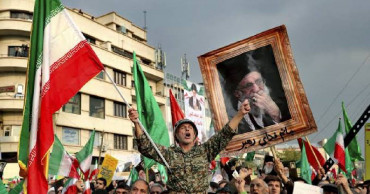Iran protests
Iran protests: survivors tell of widespread killings amid security crackdown
Young Iranians who took part in recent nationwide protests have told the BBC that the security forces’ response marked one of the deadliest crackdowns in the history of the Islamic Republic, as human rights groups report thousands of deaths amid a near-total communications blackout.
Several protesters from Tehran and other cities said the unrest, which began on Dec 28 over worsening economic conditions, rapidly escalated into mass demonstrations demanding political change. They said the authorities responded with overwhelming force as protests intensified on Jan 8 and 9.
A 29-year-old woman from Tehran said the scale of the killings was unprecedented compared with earlier protests. She claimed to personally know at least 13 people who had been killed during the unrest, adding that demonstrations in her area were peaceful before security forces opened fire.
Another protester, a 24-year-old man from Tehran, said he had never witnessed such large crowds or such levels of violence. He said many people continued to protest despite the deaths, believing they had nothing left to lose.
According to the US-based Human Rights Activists News Agency (Hrana), at least 6,159 people have been confirmed killed since the protests began, including protesters, children and individuals affiliated with the government. Hrana said it is investigating reports of thousands more deaths and warned that the confirmed toll is likely to rise.
Norway-based group Iran Human Rights has said the final death toll could exceed 25,000.
Iranian authorities, however, said more than 3,100 people were killed, claiming most were security personnel or bystanders targeted by what they described as “rioters”.
Due to restrictions on international media, foreign journalists have been unable to report freely inside Iran. However, videos verified by the BBC appear to show security forces using live ammunition and pellet guns against crowds.
Protesters also described widespread injuries, particularly to the face and eyes, and said hospitals were overwhelmed with wounded demonstrators. Some said they avoided public hospitals for fear of arrest.
Several activists and witnesses alleged that authorities pressured families of those killed, demanding large sums of money or requiring victims to be recorded as members of security forces in order to release bodies. Human rights groups say such practices may be intended to intimidate families and obscure the true scale of the killings.
The communications shutdown has further deepened fear and uncertainty, with protesters saying they struggled to obtain information about missing friends and relatives during the unrest.
Iran’s leadership has blamed foreign powers, particularly the United States, for fomenting the protests, a claim repeatedly rejected by protesters and rights groups.
With inputs from BBC
1 month ago
At least 6,126 killed in Iran protests, activists say
At least 6,126 people have died in Iran’s crackdown on nationwide protests, activists said Tuesday, while many more remain missing or feared dead.
The Human Rights Activists News Agency, based in the U.S., said the dead include 5,777 protesters, 214 government-affiliated forces, 86 children and 49 other civilians. Over 41,800 people have been arrested. Iran’s government reports a lower death toll of 3,117.
The protests began on Dec. 28 after the Iranian currency, the rial, fell sharply. Demonstrations quickly spread across the country and were met with a violent crackdown. Authorities have blocked the internet, making independent verification difficult.
Meanwhile, the U.S. has sent the USS Abraham Lincoln aircraft carrier and supporting warships to the Middle East, giving it the ability to respond militarily if needed. Some Iranian-backed militias have signaled readiness to act if Iran is attacked.
Iran has warned that any conflict could engulf the region, but its proxy forces in the Middle East appear disorganized after recent conflicts, including Israel’s 12-day war targeting Iran-backed groups.
The scale of the protests and the government’s response is the deadliest unrest in Iran in decades, drawing comparisons with the 1979 Islamic Revolution.
UN and U.S. officials have raised concerns about human rights violations, while Iran accuses foreign powers of encouraging the unrest.
The situation remains tense as both domestic protests and regional military threats continue.
1 month ago
Deaths in Iran top 500 amid escalating crackdown, activists say
The death toll in the crackdown on nationwide protests in Iran spiked Sunday to at least 538 people, activists said.
Over 10,600 people have been detained, said the U.S.-based Human Rights Activists News Agency.
Of those killed, 490 are protesters and 48 are members of the security forces, it said, warning the toll is likely to go up.
With the internet down in Iran and phone lines cut off, gauging the demonstrations from abroad has grown more difficult.
The activist group, which relies on activists in Iran crosschecking information, has offered accurate tolls in previous rounds of unrest in the Islamic Republic.
The Iranian government has not offered any overall casualty figures for the demonstrations. The Associated Press has been unable to independently assess the toll, given that internet and international phone calls are now being blocked in Iran.
Parliament rallies
Iranian state television broadcast the parliament session live. Qalibaf, a hard-liner who has run for the presidency in the past, gave a speech applauding police and Iran's paramilitary Revolutionary Guard, particularly its all-volunteer Basij, for having “stood firm” during the protests.
He went on to directly threaten Israel, “the occupied territory” as he referred to it, and the U.S. military, possibly with a preemptive strike.
“In the event of an attack on Iran, both the occupied territory and all American military centers, bases and ships in the region will be our legitimate targets,” Qalibaf said. “We do not consider ourselves limited to reacting after the action and will act based on any objective signs of a threat.”
Lawmakers rushed the dais in the Iranian parliament, shouting: “Death to America!”
It remains unclear just how serious Iran is about launching a strike, particularly after its air defenses were destroyed during the 12-day war in June with Israel. Any decision to go to war would rest with Iran's 86-year-old Supreme Leader Ayatollah Ali Khamenei.
The U.S. military has said in the Mideast it is “postured with forces that span the full range of combat capability to defend our forces, our partners and allies and U.S. interests.” Iran targeted U.S. forces at Al Udeid Air Base in Qatar back in June, while the U.S. Navy's Mideast-based 5th Fleet is stationed in the island kingdom of Bahrain.
Israel, meanwhile, is “watching closely” the situation between the U.S. and Iran, said an Israeli official, who spoke on condition of anonymity due to not being authorized to speak to journalists. Israeli Prime Minister Benjamin Netanyahu spoke with U.S. Secretary of State Marco Rubio overnight on topics including Iran, the official added.
“The people of Israel, the entire world, are in awe of the tremendous heroism of the citizens of Iran,” said Netanyahu, a longtime Iran hawk.
The U.S.-based Human Rights Activists News Agency, which relies on activists in Iran cross-checking information, offered the new death toll of 203 on Sunday, a large jump. Of those killed, 162 are protesters and 41 are members of the security forces, it said. The agency also acknowledged receiving claims of far more deaths that it was still assessing as over 3,280 others have been arrested.
The group has offered accurate tolls in previous rounds of unrest in the Islamic Republic. The Iranian government has not offered any overall casualty figures for the demonstrations.
The Associated Press has been unable to independently assess the toll, as communications with Iran have been cut.
At the Vatican, Pope Leo XIV mentioned Iran as a place "where ongoing tensions continue to claim many lives."
“I hope and pray that dialogue and peace may be patiently nurtured in pursuit of the common good of the whole of society,” he said.
Protests in Tehran and Mashhad
Online videos sent out of Iran, likely using Starlink satellite transmitters, purportedly showed demonstrators gathering in northern Tehran's Punak neighborhood. There, it appeared authorities shut off streets, with protesters waving their lit mobile phones. Others banged metal while fireworks went off.
“The pattern of protests in the capital has largely taken the form of scattered, short-lived, and fluid gatherings, an approach shaped in response to the heavy presence of security forces and increased field pressure,” the Human Rights Activists News Agency said. “Reports were received of surveillance drones flying overhead and movements by security forces around protest locations, indicating ongoing monitoring and security control.”
In Mashhad, Iran's second-largest city some 725 kilometers (450 miles) northeast of Tehran, footage purported to show protesters confronting security forces. Protests also appeared to happen in Kerman, 800 kilometers (500 miles) southeast of Tehran.
Iranian state television on Sunday morning had their correspondents appear on the streets in several cities to show calm areas with a date stamp shown on screen. Tehran and Mashhad were not included.
Government rhetoric also ratcheted up Sunday. Ali Larijani, a top security official, accused some demonstrators of “killing people or burning some people, which is very similar to what ISIS does,” referring to the Islamic State group by an acronym.
State TV aired funerals of slain security force members while reporting another six had been killed in Kermanshah. In Fars province, violence killed 13 people, and seven security forces were killed in North Khorasan province, it added. It also showed a pickup truck full of bodies in body bags and later a morgue.
Even Iran's reformist President Masoud Pezeshkian, who had been trying to ease anger before the demonstrations exploded in recent days, offered a hardening tone in an interview aired Sunday.
“People have concerns, we should sit with them and if it is our duty, we should resolve their concerns,” Pezeshkian said. “But the higher duty is not to allow a group of rioters to come and destroy the entire society.”
More demonstrations planned Sunday
Iran’s exiled Crown Prince Reza Pahlavi asked in his latest message for demonstrators to take to the streets Sunday.
Demonstrators have shouted in support of the shah in some protests, but it isn’t clear whether that’s support for Pahlavi himself or a desire to return to a time before the 1979 Islamic Revolution. Pahlavi’s support of and from Israel has drawn criticism in the past, particularly after the 12-day war.
The demonstrations began Dec. 28 over the collapse of the Iranian rial currency, which trades at over 1.4 million to $1, as the country’s economy is squeezed by international sanctions in part levied over its nuclear program. The protests intensified and grew into calls directly challenging Iran’s theocracy.
1 month ago
22,000 arrested in Iran protests pardoned
The head of Iran's judiciary says 22,000 people arrested in the recent protests that swept the Islamic Republic have been pardoned.
The state-run IRNA news agency quoted Gholamhossein Mohseni Ejehi on Monday as announcing the figure. The Associated Press could not independently verify the statement.
State media previously suggested Supreme Leader Ayatollah Ali Khamenei could pardon that many swept up in the demonstrations ahead of the Muslim holy fasting month of Ramadan.
The protests began in September over the death of a 22-year-old woman named Mahsa Amini after she was detained by the country's morality police.
2 years ago
Iran protests: Solidarity rallies held in US, Europe showing int'l support
Chanting crowds marched in the streets of Berlin, Washington DC and Los Angeles on Saturday in a show of international support for demonstrators facing a violent government crackdown in Iran, sparked by the death of 22-year-old Mahsa Amini in the custody of that country's morality police.
On the U.S. National Mall, thousands of women and men of all ages — wearing green, white and red, the colors of the Iran flag — shouted in rhythm. “Be scared. Be scared. We are one in this,” demonstrators yelled, before marching to the White House. “Say her name! Mahsa!”
The demonstrations, put together by grassroots organizers from around the United States, drew Iranians from across the Washington D.C. area, with some travelling down from Toronto to join the crowd.
In Los Angeles, home to the biggest population of Iranians outside of Iran, a throng of protesters formed a slow-moving procession along blocks of a closed downtown street. They chanted for the fall of Iran's government and waved hundreds of Iranian flags that turned the horizon into a undulating wave of red, white and green.
“We want freedom,” they thundered.
Shooka Scharm, an attorney who was born in the U.S. after her parents fled the Iranian revolution, was wearing a T-shirt with the slogan “Women, Life, Freedom” in English and Farsi. In Iran “women are like a second-class citizen and they are sick of it,” Scharm said.
Iran's nationwide antigovernment protest movement first focused on the country’s mandatory hijab covering for women following Amiri’s death on Sept. 16. The demonstrations there have since transformed into the greatest challenge to the Islamic Republic since the 2009 Green Movement over disputed elections. In Tehran on Saturday, more antigovernment protests took place at several universities.
Iran’s security forces have dispersed gatherings in that country with live ammunition and tear gas, killing over 200 people, including teenage girls, according to rights groups.
The Biden administration has said it condemns the brutality and repression against the citizens of Iran and that it will look for ways to impose more sanctions against the Iranian government if the violence continues.
Between chants, protesters in D.C. broke into song, singing traditional Persian music about life and freedom — all written after the revolution in 1979 brought religious fundamentalists to power in Iran. They sang one in particular in unison — “Baraye,” meaning because of, which has become the unofficial anthem of the Iran protests. The artist of that song, Shervin Hajipour, was arrested shortly after posting the song to his Instagram in late September. It accrued more than 40 million views.
“Because of women, life, freedom,” protesters sang, echoing a popular protest chant: “Azadi" — Freedom.
The movement in Iran is rooted in the same issues as in the U.S. and around the globe, said protester Samin Aayanifard, 28, who left Iran three years ago. “It’s forced hijab in Iran and here in America, after 50 years, women’s bodies are under control,” said Aayanifard, who drove from East Lansing, Michigan to join the D.C. march. She referred to rollbacks of abortion laws in the United States. “It’s about control over women’s bodies.”
Several weeks of Saturday solidarity rallies in the U.S. capital have drawn growing crowds.
In Berlin, a crowd estimated by German police at several tens of thousands turned out to show solidarity for the women and activists leading the movement for the past few weeks in Iran. The protests in Germany's capital, organized by the Woman(asterisk) Life Freedom Collective, began at the Victory Column in Berlin’s Tiergarten park and continued as a march through central Berlin.
Some demonstrators there said they had come from elsewhere in Germany and other European countries to show their support.
“It is so important for us to be here, to be the voice of the people of Iran, who are killed on the streets,” said Shakib Lolo, who is from Iran but lives in the Netherlands. “And this is not a protest anymore, this is a revolution, in Iran. And the people of the world have to see it.”
3 years ago
Iran protests point to turmoil in the future
Even among hardliners in Iran, there seems to be an acknowledgment of one fact after widespread protests, violence and a security force crackdown following a spike in government-set gasoline prices: This will not be the last time demonstrators come out on the street.
6 years ago











